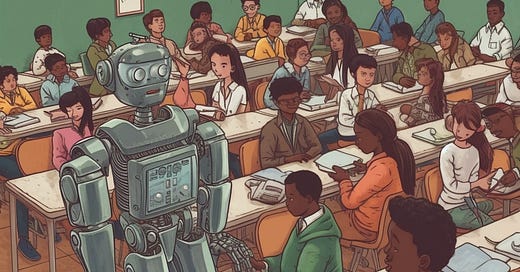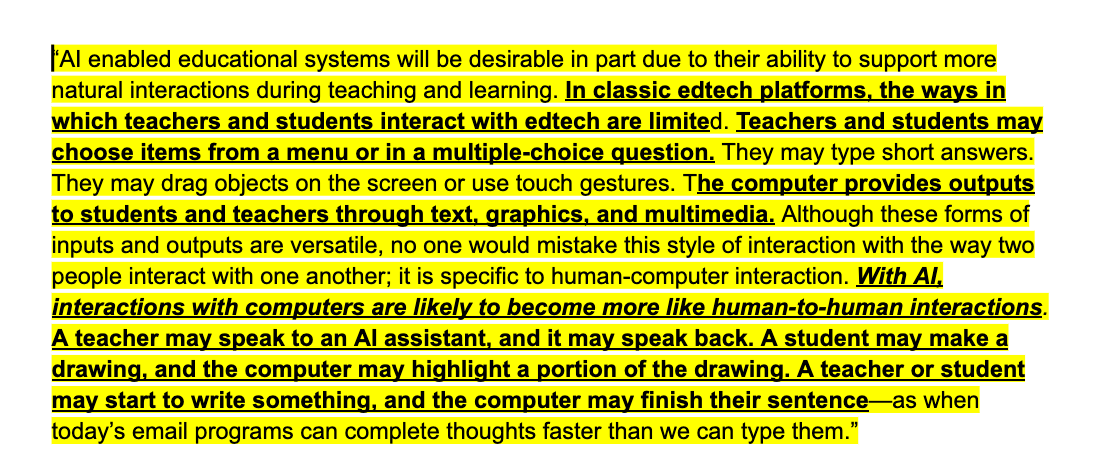We Need to Involve Everyone: AI isn’t Just Another “EdTech” Tool
Introduction
Yes, AI is a type of “technology.”
Yes, AI is used in “education.”
Yes, it’s a logical fallacy to assume that because two things are similar in one way, they are meaningfully similar in other ways. And while analogies can often boost understanding of a new idea, they can also limit understanding by creating the assumption that they are alike in all ways.
In this situation, pretending AI is just another piece of technology and limiting discussion of it to the corners of those with that interest is, quite honestly, a recipe for disaster, as it completely underestimates the significant
Introduction
Yes, AI is a type of “technology.”
Yes, AI is used in “education.”
Yes, it’s a logical fallacy to assume that because two things are similar in one way, they are meaningfully similar in other ways. And while analogies can often boost understanding of a new idea, they can also limit understanding by creating the assumption that they are alike in all ways.
In this situation, pretending AI is just another piece of technology and limiting discussion of it to the corners of those with that interest is, quite honestly, a recipe for disaster, as it completely underestimates the significant impact it will have on the way students learn, their own interpersonal relationships, student-teacher dynamics, school and personal security, ethics, and how the world has changed and will continue to change.
The simple reality is that you don’t relate to a SmartBoard the way you relate to an AI.
[Note on terminology: I use the terms “bot,” “(ro)bots” and “AIs” interchangeably]
How is AI different from other pieces of edtech?
Here are some critical differences between AI and any other piece of educational technology:
It can do your work and your students’ work. PCs help you and your students do your own work. They marginally improve it by helping to fix your grammar and spelling. They save your work for easy sharing and reuse. They allow you to project your work onto an electronic board, so you don’t have to get chalk or ink all over your hands. They allow you to communicate with your parents without having to call them. AIs can now produce most of that content and most of your students’ content.
It can interact with you. Yes, it’s a (ro)bot. Those who use AIs like ChatGPT 4 have interactive conversations with them; they do not prompt them for a magical answer. As it converses with you, it can help you unpack the topic you are discussing. As noted by the US Department of Education this May.
You can fall in love with it. Thousands of people are falling in love with AIs. Perhaps Bill Gates fell in love with Windows, and maybe Steve Jobs fell in love with the iPhone, but that was probably the extent of it.
You can get angry with it. That will probably happen when it tells you a student earned an “A” on a paper and you think he deserves a “B.” As noted by the US Department of Education this May.
It will be as smart as or smarter than you and your students. I don’t say this to be rude, but AIs already know more than us, and some can think faster than us. They only have limited reasoning abilities now, but those will expand. I don’t know of any leading thinker who does not believe they will be smarter than us in the not-too-distant future.
It can teach your students better than you can in some ways. AI tutors are available 24/7; they don’t get “testy,” and they will likely follow your students’ entire academic careers and know them well. They can answer every question your student has. They will eventually stop hallucinating (or at least start hallucinating less than people do); when they do, they will know your field better than you.
The human side of your teaching will become your most important asset. Since AIs will understand the content as well or better than you, what you bring to the table as a human will be the most important thing.
It will simulate part of your humanity. While I don’t know of anyone who thinks AIs will be able to develop the attributes that make us human, they are going to be able to simulate many of them, which is why people are starting to fall in love with them.
What does this mean?
Generally, I think it means we need to include expertise way beyond EdTech. Across the board, what type of expertise is needed as we navigate into this AI world and help students live and work in it?
Edtech specialists. Yes, since it’s a piece of technology and since many EdTech folks have experience with primitive AI systems and are developing knowledge of these new technologies and how LLMs work, their expertise is obviously essential. Their knowledge related to the security of school networks will be essential.
Communications experts. Many individuals study and teach human communication for a living. While communicating with a robot is not the same as communicating with a human, communicating with a robot does involve communicating through language, and a lot has been written about communicating through language. Language is quite powerful; it underlies why people are developing relationships with AIs and will largely determine whether or not people will eventually believe they are sentient and conscious.
Educational standards designers Learning standards will have to change in the world of AI. To give one example, Professor Sarah Elaine Eaton argues that we are living in a “post-plagiarism world.” While this may come as a shock to many (“hey, we shouldn’t give up”), the reality is that AI “co-pilots” are being integrated into Word, Google Docs and every writing system. The known failures of AI writing detectors aside, there is no way to know what students are writing “alone” or with AI co-pilots. But since their writing with a co-pilot should be substantially better than their writing without one, how should our writing standards change? Since students will now be able to learn with bots or individual tutors, what more should we expect them to be able to learn? Should our learning goals change, or should we just keep hoping our students can do as well on the SAT as robots? Does the SAT still measure the important skills we need humans to develop in order so they can get a job in a world where AI can do a lot of white-collar work?
Ethicists. AI is introducing critical questions related to the idea of “original” work, privacy, copyright, discrimination and representation, authenticity in relationships, obligations to the less fortunate, identity, and even what it means to be human. The latter is a fascinating question that will now be of interest to almost everyone.
Historians. How did the world end up like it is today? Do we understand that democratic ideals and governments are only 200 years old and that these technologies will impact the rate of democratization and the value we place on them? What caused past wars and genocides? Was it the ability of a leader to manipulate the public? Do these technologies make such manipulation more likely?
Psychologists and guidance counselors? We need psychologists to weigh in on the communication issues discussed above and to help us manage our own relationships with robots. In schools, guidance counselors will need to understand these dynamics and work with students. Students will need guidance navigating the relationships between their AI learning bots and their teachers. The anxiety that results from losing a job or even just the fear of losing a job will affect many adults. Many students will fear their efforts in school will not pay off with jobs in the future.
All teachers. AIs are essentially individual tutors for all students. How will this change classroom dynamics? How will this impact what students learn? How will it impact how quickly students can learn? What role do teachers want these bots to play in the classroom?
Religious leaders. The world has many different religions, but one of the underlying premises of many of them is that “homo sapiens” (“many the wise”) are God’s “chosen people.” But if the machines will be smarter than us and can replicate our abilities, why are we so special? If we are, perhaps, just a step in the evolution of intelligence (Hinton, Kanolis), why are we so special? And to make it more concrete, once machines develop consciousness, should they be baptized?
Thinkers. The integration of AI into society may be the biggest change in human history, and we need as many people as possible to think about how we relate to it. Is it a tool (Altman)? Is it an intern or co-worker (Mollick)? Is it a child we should develop to exceed our abilities (Kellis)? How should we think of AIs, and how should we relate to them? Does this context change based on our own roles as students and/or teachers? What might the jobs of the future be, and how can we best prepare our students for those jobs?
We need everyone at the table.







